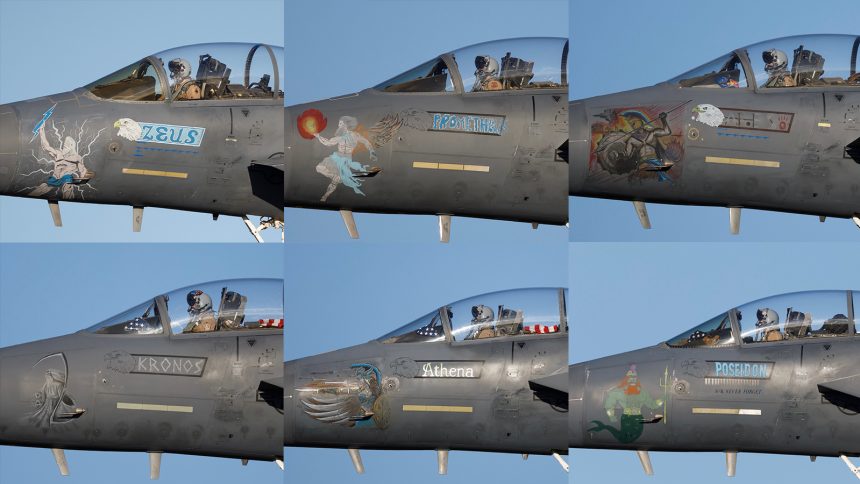Let’s have a look at the markings sported by the final six F-15E Strike Eagles of the 492nd Fighter Squadron, which have just returned from their deployment to the Middle East.
The final six F-15E Strike Eagle jets belonging to the 492nd Fighter Squadron “Madhatters” of the 48th Fighter Wing, deployed to the CENTCOM AOR (Area Of Operation), returned to RAF Lakenheath, UK, on Dec. 19, 2024. This followed the return of the first flight of six Strike Eagles on Dec. 17.
The Strike Eagles arrived at their homebase as TABOR 61-66, around 10.21AM LT and, like the first “batch”, sported unique nicknames and nose arts inspired by figures from Greek mythology, along with some interesting bomb markings, representing the employment in combat of AIM-9X, SDBs (Small Diameter Bombs) and JDAMs (Joint Direct Attack Munitions).
The jets landed in the following order:
- LN AF 97-0221 “Zeus” (with Bolar 1 on the tail)
- LN AF 91-0331 “Prometheus”
- LN AF 98-134 “Ares”
- LN AF 91-0301 “Kronos”
- LN AF 97-0220 “Athena”
- LN AF 97-0218 “Poseidon”
As mentioned, the “theme” chosen by the 492nd Squadron for the nicknames and nose art is based on Greek mythology figures, rather than strictly “gods.” In fact, while Zeus, Ares, Athena, and Poseidon are Olympian gods, Prometheus and Kronos belong to the older generation of Titans, who preceded the Olympians in Greek mythology.
Our contributor Stewart Jack managed to snap some shots of the jets as they arrived into RAF Lakenheath in sunny weather.
Here they are.
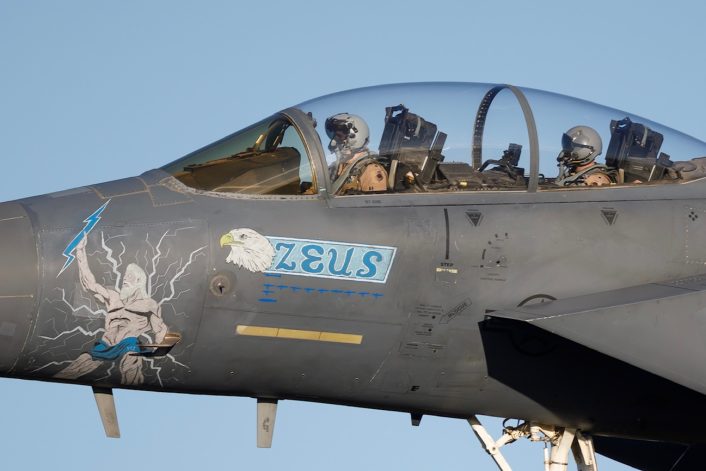
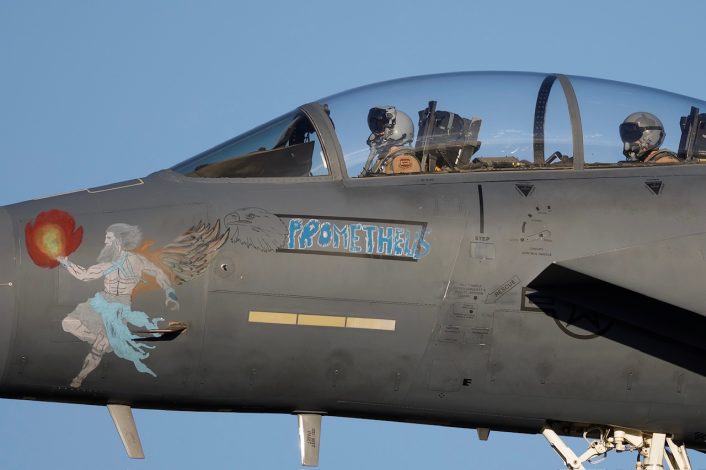
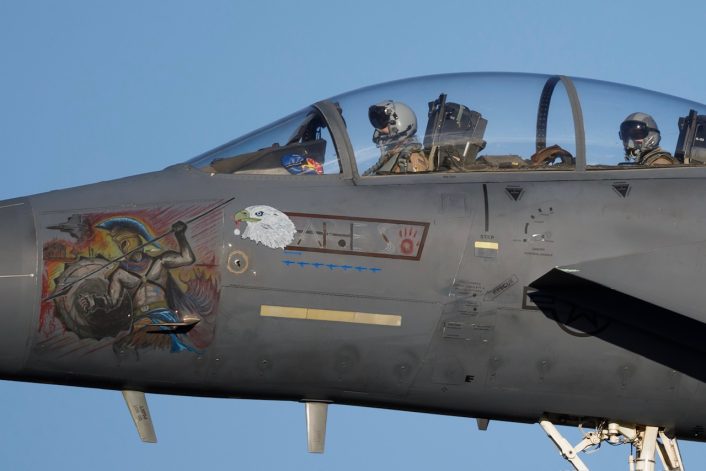
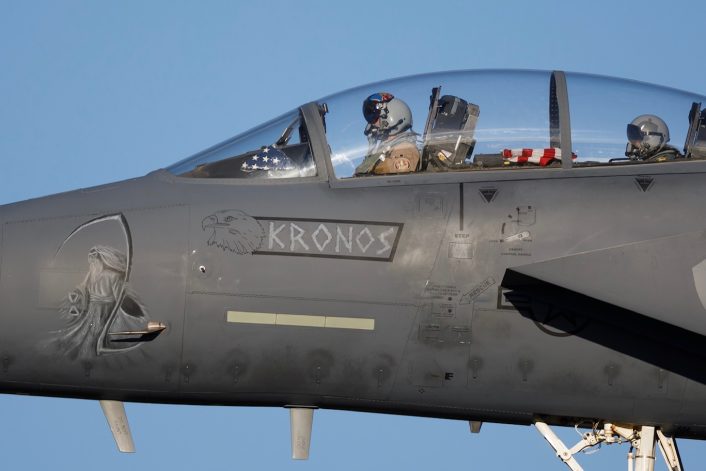
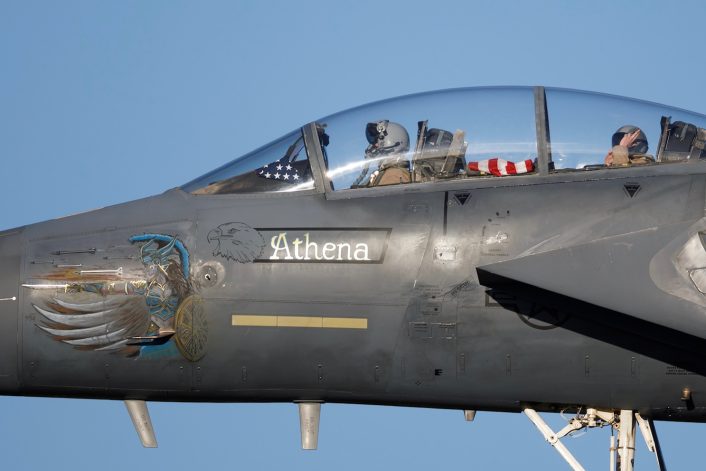
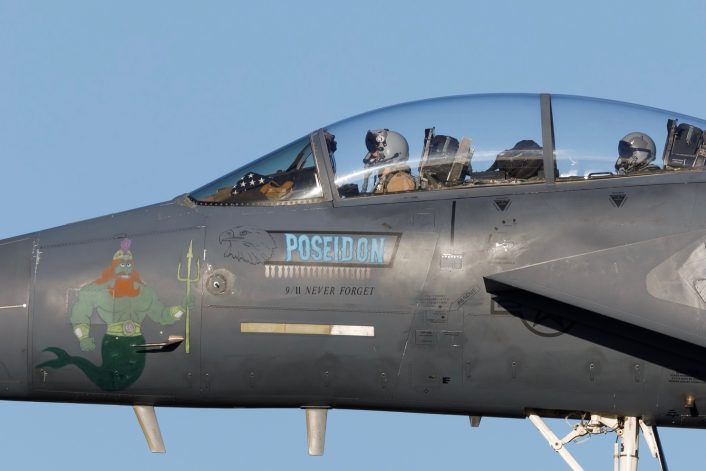
As explained in the article about the return of the first six 492nd FS F-15Es, the “Madhatters” deployed to the CENTCOM region in November, replacing the Strike Eagles from Seymour Johnson Air Force Base, North Carolina, which had recently completed their rotation in the Middle East. This deployment also bolstered U.S. military presence amid rising regional tensions: on Sept. 27, 2024, during an operation dubbed “New Order,” the Israeli Air Force used its F-15I Ra’am jets equipped with GPS-guided GBU-31(V)3/B JDAM bunker-buster bombs to conduct a precision strike that killed Hezbollah leader Hassan Nasrallah. In response, Iran launched a massive retaliation, firing 180 ballistic missiles.
The 492nd FS Strike Eagles arrived in the region on Nov. 7, 2024, joining F-15Es from Mountain Home AFB, Idaho, which had been deployed since October. This came roughly a year after the 494th Fighter Squadron “Panthers,” also from Lakenheath, had their own deployment to the area.
During their time there, the Panthers played a pivotal role in defending against Iran’s large-scale attack on Israel in April: on the night of April 13-14, 2024, the Panthers, along with other U.S. and allied forces, took part in the largest air-to-air engagement in over 50 years. Iranian forces, supported by the Houthi group in Yemen and proxies in Iraq, launched a coordinated assault on Israel involving 170 kamikaze drones, 120 medium-range ballistic missiles, and 30 cruise missiles. Israeli air defenses worked tirelessly to repel the attack, with critical support from the 494th’s F-15Es and Strike Eagles from Seymour Johnson’s 335th Fighter Squadron.
Together, these crews successfully destroyed over 80 drones, preventing significant damage from more than 300 airborne threats targeting Israel. For their efforts during this mission, the 494th aircrews received high praise from President Biden and were honored with numerous awards, including two Silver Stars, six Distinguished Flying Crosses with valor, four Distinguished Flying Crosses with combat devices, four additional Distinguished Flying Crosses, two Bronze Stars, and multiple Air and Space Commendation and Achievement Medals.
Bolars
As a side note, the F-15E “Zeus” that led the 492nd FS flight returning to RAF Lakenheath on Dec. 19, 2024, also sported “Bolar 1” on the tail. This comes from “Bolar”, which is another nickname of the 492nd FS: when the squadron was based at Chaumont Air Base in France, in the early 1950s, they were known for wearing berets. After relocating to England, they swapped the berets for bowler hats, a classic British style with a rounded crown. Even though it’s not officially part of their uniform, the bowler hat tradition has stuck around to this day. Because flight callsigns are limited to five characters, the squadron uses “Bolar” instead of “bowler” for local flying operations.
The 48th Fighter Wing’s official website referred to the squadron as the “Madhatters” in articles from 2006, 2010, and now and then afterward. But in recent years, like in 2017, 2020, and 2022 articles, the name “Bolars” seems to be used more often.
The squadron also keeps up the tradition of adopting headwear tied to wherever they’re stationed. For example, during their deployment in Turkey, members of the Madhatters wore blue fez hats.
H/T to our friend and contributor Stewart Jack for the photos!

